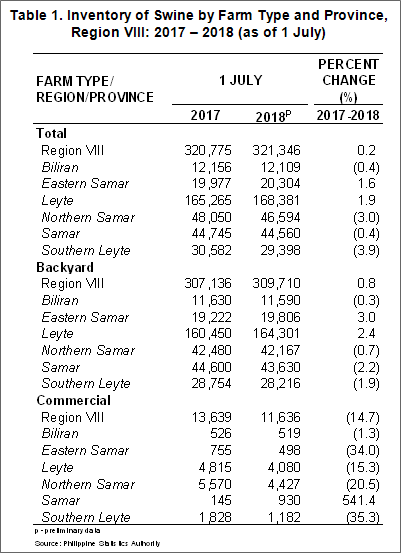|

From
left to right: Monique Castro, PCPPI Senior Manager
Corporate Affairs and Communications; Joy Juson, Task Force
Bangon Marawi; Butch Meily, President PDRF; Bombit Alonto
Adiong, Vice Governor of Lanao del Sur, and Bob Flores,
PCPPI Cagayan De Oro General Manager during the turnover of
the water tank in Bahay Pag-asa, Brgy. BatoItua, Marawi
City. |
Pepsi Philippines
and PDRF turnover first 20,000-liter water tank in Marawi City
By
PDRF
September 3, 2018
MARAWI CITY – The
country's major private sector driver and coordinator for disaster
resilience, the Philippine Disaster Resilience Foundation (PDRF),
together with Pepsi-Cola Products Philippines Inc. (PCPPI) turned
over the first water tank from their “Water for Peace in Marawi”
project.
This project aims to
provide 10-12 cylindrical stainless steel water tanks with
20,000-liter to 40,000-liter capacity to underserved transitional
shelter sites across the province. With the support of the Task
Force Bangon Marawi (TFBM) Working Group for WaSH concerns, part of
this project aims to conduct community training on water management
and hygiene that will form part of the Marawi City Water Sanitation
and Hygiene (WASH) masterplan.
“For quite some time now,
there is scarcity of water in these shelters, and with the water
tanks given by Pepsi Cola through PDRF, our constituents would be
able to enjoy this basic need until such time that they can finally
go back to their homes in the Most Affected Area of MarawiCity”,
said Lanao del Sur Governor Bedjoria Soraya Alonto Adiong. Vice
Governor Mamintal Alonto Adiong Jr. was present during the turnover.
“We hope that with the
water, the people will have a renewed determination to pursue the
rebuilding of the city. The doors of Pepsi are always open and we
will be with you every step of the way,” added Pepsi CDO Plant
general manager Bob Flores.
Last November 10 2017,
PDRF together with the Philippine Business for Social Progress (PBSP),
the Makati Business Club (MBC), United Nations Development Programme
(UNDP), Association of Foundations (AF), and CODE-NGO formed the
United for Marawi consortium. This private sector-led group pledged
their support for the rehabilitation and recovery of Marawi.
“Water is the most
important thing in the world. The UN calls it a fundamental right.
Thanks to Pepsi, people will be able to quench their thirst, wash
their hands and bodies to prevent disease, and feel human again,”
said PDRF president Butch Meily.
The partnership between
PDRF, PCPPI, Task Force Bangon Marawi, and the Lanao del Sur
Provincial Government encourages participation of different
stakeholders in the rehabilitation efforts in the war-stricken area.
PDRF first worked with
Pepsi last year for the donation and installation of 1,000 gasera
lights and 500 solar street lamps in Marawi.
Teachers worry
over BuCor’s recruitment of teachers, calls on gov’t to increase
teachers’ salaries
By
Alliance of Concerned
Teachers
September 3, 2018
QUEZON CITY – The
Alliance of Concerned Teachers expressed concern over the recently
released call for licensed teachers to apply for Correction
Technical Officer positions under the Bureau of Corrections, saying
that this might lessen further the already inadequate number of
active teachers in public schools.
ACT research shows that
BuCor Technical Officers receive a starting salary of P29,668.00.
Entry-level teachers under the Department of Education, on the other
hand, get only a monthly salary of P20,179.00. BuCor Technical
Officers got more than 100% salary increase in March 2018, when the
salary adjustments for BuCor personnel were implemented to harmonize
with the existing salary levels of uniformed personnel which were
doubled in January.
“DepEd recently said that
that the reason why many teaching positions remain unfilled is
because of insufficiency in the number of qualified applicants. If
this is true, how will the education system cope if teachers would
be forced out of the profession in search of decent and livable
wages?” asked Raymond Basilio, Secretary-General of the Alliance of
Concerned Teachers Philippines.
He explained further that
the situation only prove the “dilemma and inconsistencies that come
about when salary adjustments in government are done one-sidedly.”
“While Budget Secretary
Benjamin Diokno speaks about studying the salary scheme in
government to match the prevailing rates in the private sector, what
he should be doing instead is to remedy the distorted salary scheme
within the government itself by effecting immediately a substantive
increase in the salaries of civilian public employees to be at par
with the uniformed personnel,” Basilio asserted.
He explained that teachers
are suffering the double burden of insufficient number of teachers
and low salaries. A major factor in the overloading of teachers and
large class size is the insufficient number of active teachers.
Teachers’ salaries, on the other hand, could no longer meet the
needs of their families. He stressed that, “by the day, the
purchasing power of teachers’ salaries gets eroded by inflation and
they are in no way commensurate to the multiple roles which teachers
take on in school,” Basilio said.
“We unfortunately see no
signs of the promised wage hike for teachers as the Duterte
government proposed for budget cuts in education in 2019 while DepEd
Sec. Leonor Briones betrayed the teachers when she readily accepted
the cuts in the recent Congress budget hearing,’ said Basilio.
Earlier last week, the DBM-proposed
budget for DepEd was deliberated in Congress, in which a P77B cut on
DepEd’s proposal for 2019 was presented to the Committee on
Appropriations.
“If we want to improve the
education system, we must allot ample resources for it, which
include budget for higher salaries and additional staff. Otherwise,
it is our fear that the number of educators will continue to go down
and transfer to jobs with better pay such as the ones in BuCor,”
explained Basilio.
Basilio called on the
President to make good on his promise to teachers, “if the President
can do it for uniformed personnel as well as employees in BuCor,
surely he can and he must do the same for teachers.”
“Teachers’ Month is fast
approaching, with the opening only three days away. Teachers and
their significant contribution to society can best be honored by
implementing a salary increase and by providing a higher budget for
education,” concluded Basilio.
Ministers draft
blueprint to conclude RCEP
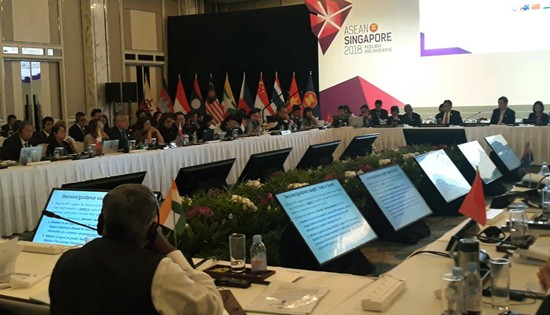
By
DTI-OSEC-PRU
September 3, 2018
SINGAPORE – The
sixteen (16) Regional Comprehensive Economic Partnership (RCEP)
Ministers from ASEAN, Australia, China, India, Japan, Korea and New
Zealand adopted the “Package of Year-End Deliverables” that lays
down the blueprint for concluding the negotiations during the 6th
RCEP Ministerial Meeting on 30-31 August in Singapore.
This document, which was
developed by the Trade Negotiating Committee, also tasked
negotiators to redouble efforts in order to advance the political
mandate.
“All Parties are eager and
ready to work towards achieving the targets set by the end of this
year, with each country wanting to bring home a good deal for their
peoples. RCEP will send a positive signal to the world that the RCEP
region is open for business,” said DTI Secretary and Philippines
RCEP Minister Ramon M. Lopez.
RCEP will be the largest
Free Trade Agreement that the Philippines will be part of once
concluded. It covers the 3.2 Billion market size of the RCEP
participating countries. It is also a mega-regional trade pact that
the ASEAN ever engaged in with the huge contribution in terms of GDP
and consumer-based patronage.
This will provide market
opportunities to all the participating countries, which will impart
a higher standard of living due to the vast choice of goods and
services as well as contribute greater job generation.
“These ministers are
cognizant of the key elements of the agreement that we started last
year under the Philippine chairmanship and we built on it. Time
allowed some Ministers to develop more acceptable parameters, and
extreme flexibilities were also exercised. The negotiations are
already at the stage wherein high-level policy calls need to be
made, keeping in mind that the quality of the final outcomes for the
RCEP should not be sacrificed nor compromised,” Secretary Lopez
added.
The negotiations were
provided a boost by the conclusion of the Chapters on Customs
Procedures and Trade Facilitation and Government Procurement, which
will serve to facilitate expedite trade in merchandise goods. The
Small and Medium Enterprises (SME) and Economic and Technical
Cooperation (ECOTECH) Chapters were completed by in 2016.
New Zealand will host the
24th RCEP Trade Negotiating Round in end-October. The Round is
critical as negotiators prepare for their report to RCEP Ministers
and Leaders.
Second quarter
chicken situationer in Eastern Visayas
By
PSA-8
September 1, 2018
TACLOBAN CITY – The
chicken industry in Eastern Visayas posted a 4.6% decrease in
production during the second quarter of 2018. Based on the
preliminary data, the total chicken production in the region went
down to 13,097 metric tons (MT) in the second quarter of 2018 from
13,734 MT in the same quarter last year.
Region VIII accounted for
2.8% of the country’s total chicken production during the second
quarter of 2018. It ranked seventh among the regions with low
chicken production in the country.
Meanwhile, as of 1 July
2018, the total chicken population in Eastern Visayas stood at
3,291,860 birds. This registered an increase of 2.0 percent from its
3,226,769 inventory as of 1 July 2017.
Among provinces, Leyte
recorded the highest number of chicken at 1,813,210 birds, which
comprised more than half or 55.1% of the total chicken population in
the region. Samar ranked second with 496,335 birds, which accounted
for 15.1% of the region’s total chicken inventory. Eastern Samar,
meanwhile, registered the lowest inventory of chicken with 2.9%
share or 95,913 birds.
By type, layer chickens
stood at 428,206 birds as of 1 July 2018. This posted a significant
growth of 25.0% from the 342,643 inventory as of 1 July 2017. All
provinces registered increases except for Leyte which recorded a
decrease of 10.4%, and Eastern Samar which had the same inventory of
5000 birds from 1 July 2017. Northern Samar posted the highest
increase at 936.4%, to 72,550 birds as of 1 July 2018 from 7,000
birds as of 1 July 2017.
On the other hand, broiler
chickens decreased slightly by 0.8% to 1,207,163 birds as of 1 July
2018 from 1,216,834 birds as of 1 July 2017. Increases registered in
Leyte (15.3%) and Southern Leyte (27.6%) were negated by the
decreases registered in Biliran (93.0%), Northern Samar (68.2%) and
Samar (21.1%). Eastern Samar, meanwhile, retained their inventory at
1,000 birds.
Similarly, the number of
native/improved chickens slightly went down by 0.6% with a total
inventory of 1,656,491 birds as of 1 July 2018 from 1,667,292 birds
as of 1 July 2017. Contributing largely to this decrease are Eastern
Samar and Biliran with a double digit drop in inventory of 17.7% and
11.5%, respectively.
A little more than half or
50.3% of the total chicken population in the region were
native/improved chickens. Broiler chickens accounted for 36.7%,
while the remaining 13.0% were layer chickens.
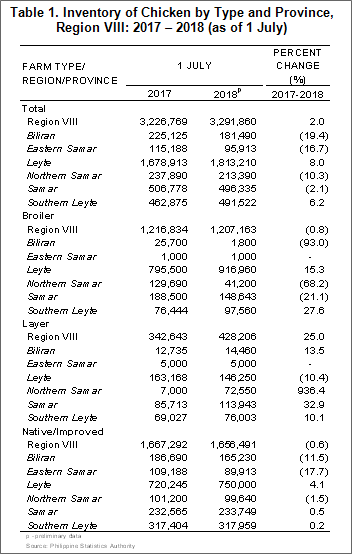
|
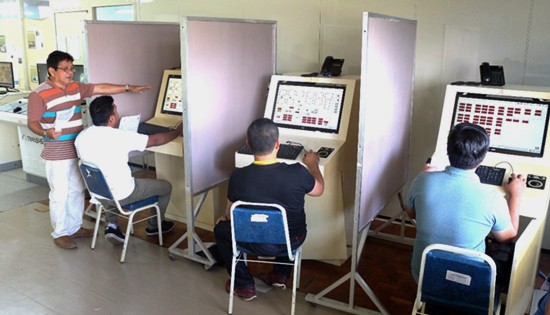
NMP’s
1st Batch of Updating Training for Officers In Charge of an
Engineering Watch with their instructor CE Salvador C. Esquibel, Jr. (left). |
NMP offers
updating training for officers in charge of an engineering watch
By
National Maritime
Polytechnic
September 1, 2018
TACLOBAN CITY – The
National Maritime Polytechnic (NMP), serving within its mandate on
upgrading the skills and competencies of the country’s seafarers
continues to pursue priority thrusts on training quality, access and
relevance and responsive maritime researches.
With its intention of
addressing the shortage of Filipino merchant marine officers, the
Agency intensified its activities on the development of new training
courses which include among others the Updating Training for
Officers In Charge of an Engineering Watch (UTOICEW) - Functions 1,
2, and 4 (Parts A and B).
It can be recalled that
the NMP submitted its application for accreditation for the said
course in CY 2016. MARINA conducted its initial inspection last
12-15 December 2016 and issued a corresponding Notice of
Deficiencies on 22 February 2017.
NMP submitted its
compliance to the deficiencies noted by MARINA on 24 March 2017. In
order to validate if indeed the deficiencies noted were duly
rectified, MARINA conducted a re-inspection on 23-24 January 2018.
As per formal letter
received from MARINA dated 14 August 2018, NMP was granted full
course approval valid for a period of three (3) years along with the
accreditation of instructors, assessors and supervisors who will be
handling the said course.
During the said period,
announced and unannounced visits will be made by MARINA STCW Office
or its duly authorized representatives to ascertain NMP’s compliance
with MARINA’s rules and regulations.
NMP is required to submit
the records of review and validation of the aforementioned course
within six (6) months from the date of its conduct. Moreover, the
records of implementation of corrective actions for audit results
both internal and external, records of review and validation of the
courses including the assessment and statistical record of trainees
enrolled / certificated must be made available during the conduct of
monitoring.
NMP’s first batch of
classes for UTOICEW Function 1 – Part A opened on 27 August 2018 and
will end on 04 September 2018 with five (5) participants. Same
enrollees will take the Function 2 – Part A (05-07 September 2018)
and Function 3 – Part A (10-13 September 2018).
UTOICEW is a 39-day course
divided into three (3) Functions. Function 1 (Marine Engineering at
the Operational Level) has five (5) modules; Function 2 (Electrical,
Electronic and Control Engineering at the Operational Level) with
two (2) modules; and Function 4 (Controlling the Operation of the
Ship and Care for Persons on Board at the Operational Level) with
four (4) modules.
Engine officers who have
taken up the course are expected to have acquired competence to be
able to: maintain a safe engineering watch; operate main and
auxiliary machinery and associated control systems; manage the
operation of propulsion plant machinery; plan and schedule
operations; operate surveillance, performance assessment and
maintain safety of propulsion plant and auxiliary machinery; operate
electrical, electronic and control systems; manage operation of
electrical and electronic control equipment; ensure compliance with
pollution prevention requirements; apply leadership and team working
skills; control trim, stability and stress; and monitor and control
compliance with legislative requirements and measures to ensure
safety of life at sea, security and the protection of the marine
environment.
Meanwhile, NMP continues
to upgrade its facilities and provide maritime trainings required
pursuant to the STCW Convention as amended in 2010 including
value-adding courses towards improving the qualifications of
Filipino seafarers for their employment acceptability and enhanced
competitiveness. It also regularly conducts maritime studies to come
up with policies for the improvement of the manpower sector of the
industry.
Buying power of
workers minimum pay down to P200 a day
By
ALU-TUCP
September 1, 2018
QUEZON CITY – THE
buying power of workers standard daily minimum pay in the private
sector nationwide fell to P200 a day beginning today, according to
monitoring by workers group Associated Labor Unions-Trade Union
Congress of the Philippines (ALU-TUCP).
Without a serious
government social safety program in place and a significant wage
increase to address the worsening economic depression, a decreasing
buying power of wage bears harmful effect to workers’ health and
capacity to produce quality goods and services needed by employers
and business owners to thrive.
In their monitoring and
evaluation of the inflation versus the daily minimum wage, ALU-TUCP
spokesperson Alan Tanjusay said the average total daily minimum wage
nationwide fell today to P200 a day effective this week from P208.83
in June 2018.
In June 2018, the total
average of different daily minimum wage rates across the country was
P335 and its equivalent buying power is P208.83.
In April 2018, the total
average rate of various daily minimum wage rates nationwide was
P330.47 and its equivalent buying power to buy goods and pay for
services was P208.38 a day. In October last year, P327 and its
equivalent capacity to buy goods and pay for services is P212.45 a
day.
“What can workers buy for
him and for his family nowadays with the value of his minimum pay of
P200 a day?” Tanjusay said warning: “without government and
employers interventions, this amount will go down further next
month.”
According to the National
Economic Development Authority (NEDA), the amount needed by a family
of five in order to live decently is P44,000 a month or P1,400 a
day.
The segment of work force
already affected by the crisis are those entry-level, rank-and-file,
contractual, short-term, and Endo (end-of-contract) employees
receiving minimum pay working in manufacturing and services sector.
However, the most heavily
affected segment of workers by high inflation and decreasing
purchasing power are those 11 million unemployed and those 15.6
million workers working in the informal economy.
“The unemployed obviously
are scraping what’s left at rock bottom and very susceptible to any
means to survive. While workers in the informal economy – since they
have no fixed income – are also very insecure,” Tanjusay said.
With this, the group
expects a lower output contribution to the country’s Gross Domestic
Product (GDP) by workers affected by shrinking value of their pay
and continuously rising prices.
The shrinking value of
their salary, the group says, impacted the workers health and their
productivity particularly their capacity to produce quality goods
and services needed by employers and business owners to prosper.
“With the poor workers
option to buy quality and nutritious food for him and for his family
has been decreasing, expect an unhappy and less productive employees
in the weeks ahead. Take note that these very vulnerable segment of
workers are already have no security of tenure, no fixed income,
inadequate social protection benefits and confronted by difficult
and stressful external forces,” said Tanjusay.
TUCP Party-list Rep.
Raymond Mendoza has filed a bill in the House of the Representatives
seeking a P320 a day across-the-board wage increase for workers in
manufacturing, agriculture and service sectors.
The ALU-TUCP has also
sought government for a P500 monthly grocery subsidy for minimum
wage earners to help them cope with rising inflation and eroding
wages.
The group also has
petitioned the 17 regional wage boards nationwide to increase
workers’ pay by P320 a day. However, only nine regional wage boards
have made wage adjustments since May this year ranging from P10 to
P56 a day on installment basis.
Rotary Club of
Calbayog receives special award from DepEd Calbayog
By
LEVIRESA
GETIGAN-BARNIZO
September 1, 2018
CALBAYOG CITY – The
Rotary Club of Calbayog received a special award as one of the
Outstanding Stakeholders of the Department of Education (DepEd),
Schools Division of Calbayog City, yesterday, August 31, 2018 at the
Calbayog Convention Center, Brgy. Capoocan, Calbayog City, Samar.
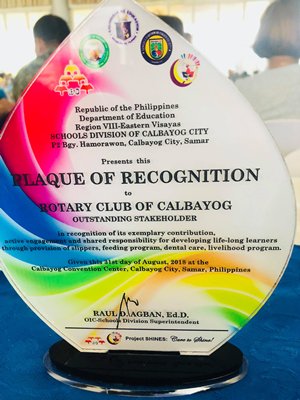 The plaque was awarded in
recognition of the club’s exemplary contribution, active engagement
and shared responsibility for developing life-long learners through
provision of slippers, feeding program, dental care, livelihood
program, and provision of school supplies to Happy Valley Clustered
Schools located at the far flung barangays in Calbayog and
Alternative Learning System (ALS) - Calbayog Arts and Design School
of Eastern Visayas (CADSEV), Brgy. Gadgaran, this city.
The plaque was awarded in
recognition of the club’s exemplary contribution, active engagement
and shared responsibility for developing life-long learners through
provision of slippers, feeding program, dental care, livelihood
program, and provision of school supplies to Happy Valley Clustered
Schools located at the far flung barangays in Calbayog and
Alternative Learning System (ALS) - Calbayog Arts and Design School
of Eastern Visayas (CADSEV), Brgy. Gadgaran, this city.
DepEd Calbayog encouraged
all its stakeholders to continue supporting the Division Office most
especially its learners that will pave way into producing graduates
as a means for poverty alleviation and economic growth involving the
working class, business sectors, local farmers, government and
non-government owned organizations, among others.
The club qualified as a
special awardee based on the monetary consideration and number of
schools which availed of its significant programs and services.
The club recognizes the
relentless and unwavering support of its partners including the
Philippine Army, Philippine National Police, People’s Outreach
Program, Kalipayan-Katitirok-Kasangkayan, and Boleros Basketball
Club in the successful delivery of its projects, programs and
services.
Other special awardees who
received the plaque of recognition are the key officials of the
respective offices of the Local Government Unit of Calbayog City
including City Mayor Ronaldo P. Aquino, Congressman Edgar Mary
Sarmiento, Philippine National Police, 8th Infantry Division,
Philippine Army, Bureau of Fire Protection, Filipino Chinese Chamber
of Commerce Inc., Puno ng Buhay, DYOG-Radyo Pilipinas-Calbayog and
broadcasters, etc.
Stop the
blacklisting of non-Filipino human rights defenders – Karapatan
By
KARAPATAN
August 31, 2018
QUEZON CITY –
“President Duterte is obviously easily ticked-off by non-Filipino
human rights defenders and activists expressing solidarity and grave
concern on the human rights situation in the Philippines. His
regime’s intolerance and harassment of these foreigners, while
working in concert with the US, China and other governments in the
plunder of the country’s resources and in pursuing anti-people
policies, betray the hollowness of his rhetoric on national
sovereignty and independent foreign policy,” said Cristina Palabay,
Karapatan Secretary General.
Last August 30, Australian
missionary Sr. Patricia Anne Fox was informed of the decision of the
Phil. Bureau of Immigration (BI) denying her appeal regarding her
deportation case. BI considered Sr. Fox as an “undesirable alien”
for allegedly participating in political activities in the
Philippines. Sr. Fox is set to file her appeal regarding the said
decision before the Department of Justice next week.
Prior to Sr. Fox, three
Methodist missionaries namely Tawanda Chandiwana of Zimbabwe, Adam
Thomas Shaw of USA and Miracle Osman of Malawi were ordered deported
by the BI for their participation in an international fact finding
mission in Mindanao.
Last August 7, lawyer and
human rights defender Prof. Gil Boehringer, who has dual citizenship
in the US and Australia, was barred from entering the country.
Boehringer was included in the blacklist order along with several
other foreign human rights defenders and activists for their alleged
participation in the November 2015 Asia-Pacific Economic Cooperation
(APEC). Boehringer denied his participation in the said rally.
The list, which was made
public by media, also included former US Member of House of
Representatives Cynthia McKinney, Palestinian freedom fighter Leila
Khaled, Australian human rights activist Peter Murphy who serves as
the Chairperson of the Global Council of the International Coalition
for Human Rights in the Philippines, Guatemalan rights activist
Samuel Villatoro, among many others.
“These unintelligent and
sloppy ‘intelligence reports’ by the Bureau of Immigration has
repeatedly been used to justify the exclusion of non-Filipinos from
the country because according to the bureau, they are “threats to
public safety and order.” These non-Filipino rights defenders have
been linked to so-called ‘communist-terrorist’ groups. These
accusations are unfounded, without any bases, malicious and
dangerous,” added Palabay.
The BI argued that these
foreigners were involved in political activities in violation of
immigration laws particularly the Immigration Operations Order
SBM-2015-025 prohibiting foreigners from participating in rallies in
the Philippines.
“Sr. Fox’s deportation
case will set a dangerous precedent if we allow the Duterte
government to continue harassing foreigners doing missionary and
human rights work in the country by simply deporting and
blacklisting them. Contrary to the BI's claims, the biggest threat
to public order and safety in the country is, in fact, President
Duterte himself, along with his fascist minions. They are the
purveyors of State policies that result to unabated human rights
violations, including Duterte's counter-insurgency campaign, martial
law in Mindanao, and the war on drugs,” ended Palabay.
|
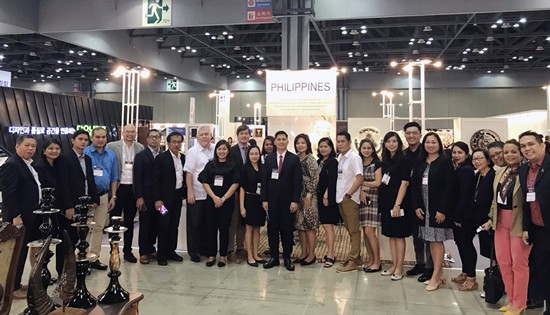
PH
furniture makers in South Korea. Ten (10) Philippine
companies selected by the ASEAN-Korea Center (AKC) are
currently participating in the Korea International Furniture
and Interior Fair at the KINTEX Exhibition Center, Gyeonggi,
Korea from 29 August to 02 September, 2018. |
DTI opens new
markets for PH furniture exporters
By
DTI-TIPG-EMB
August 31, 2018
MAKATI CITY – The
Department of Trade and Industry through its Export Marketing Bureau
(DTI-EMB) in collaboration with the Philippine Trade and Investment
Center (PTIC) in Seoul and the ASEAN Korea Centre (AKC) are
supporting Philippine exporters in expanding their market reach in
South Korea through the country’s participation at the Korea
International Furniture and Interior Fair (KOFURN) 2018 happening
from 29 August to 02 September 2018 at the Korea International
Exhibition Center in Gyeonggi, South Korea.
Ten (10) Philippine
companies assisted by the DTI-EMB through its Regional Interactive
Platform for Philippine Exporters (RIPPLES) Plus Program were
selected by the ASEAN-Korea Center (AKC) to showcase their products
and services at the AKC ASEAN Exhibition Area of the KOFURN.
These Philippine furniture
and furnishing companies which are members of the Chamber of
Furniture Industries of the Philippines, Inc. (CFIP) and Pampanga
Furniture Industries Foundation, Inc. (PFIF) include Azcor Lighting
Systems, Calfurn Manufacturing Philippines, Country Accents,
Filipino Creazione De Mano, Furnitureville, Markline Home Furnitures,
More Than A Chair, Natures Legacy Eximport, Venzon Lighting
Manufacturing, and Weavemanila.
KOFURN is the largest
furniture exhibition in South Korea which features home, office and
kitchen, interior furniture including the woodworking industry, and
a design competition which started in 1984 under the active support
of the Korean Government.
More than 350
representative firms are expected to display examples of
contemporary bed furniture, office furniture, kitchen and bath
products, sofas, lightings, carpets and flooring, wall coverings,
textiles, raw materials, accessories and outdoor furniture for
residential and commercial interiors and woodworking machinery for
furniture and related products and publications. Also expected to
visit the KOFURN 2018 are nearly 50,000 visitors both from the
domestic and overseas fronts.
The Philippine Pavilion
under the AKC ASEAN Exhibition Area of KOFURN will be joined by
other ASEAN-member countries such as Indonesia, Malaysia, Myanmar,
Singapore, Thailand, and Vietnam.
In 2017, South Korea was
among the top export markets of the Philippines with total export
values of $4.3 billion.
Second quarter
swine situationer in Eastern Visayas
By
PSA-8
August 31, 2018
TACLOBAN CITY – The
swine industry in Eastern Visayas posted a 9.0% increase in
production during the second quarter of 2018. Based on the
preliminary data, the total swine production in the region went up
to 18,316 metric tons (MT) during the quarter in review from 16,802
MT in the same quarter last year.
Eastern Visayas accounted
for 3.3% of the country’s total swine production during the second
quarter of 2018. It ranked fifth among the regions with low swine
production in the country.
As of 1 July 2018, the
total swine population in Eastern Visayas stood at 321,346 heads.
This registered a slight increase of 0.2% from its 320,775 heads as
of 1 July 2017.
Among provinces, Leyte
recorded the highest number of swine at 168,381 heads, which
comprised more than half or 52.4% of the total swine population in
the region. Northern Samar ranked second with 46,594 heads, which
accounted for 14.5% of the region’s total swine inventory. Biliran,
meanwhile, registered the lowest inventory of swine with 3.8% share
or 12,109 heads.
By farm type, swine
population raised in commercial farms stood at 11,636 heads as of 1
July 2018. This posted a decrease of 14.7% from its 13,639 heads as
of 1 July 2017. All provinces registered decreases, except Samar,
the only province that exhibited an increase of 541.4% to 930 heads
as of 1 July 2018 from 145 heads as of 1 July 2017. Southern Leyte
posted the highest decrease at 35.3%.
On the other hand, the
number of swine raised in backyard farms inched up slightly by 0.8%
to 309,710 heads as of 1 July 2018 from 307,136 heads as of 1 July
2017, where increases registered in Eastern Samar (3.0%) and Leyte
(2.4%) offset the decreases registered in Samar (2.2%), Southern
Leyte (1.9%), Northern Samar (0.7%), and Biliran (0.3%).
Almost all or 96.4% of the
total swine population in the region were raised in backyard farms
while the rest (3.6%) were in commercial farms.
